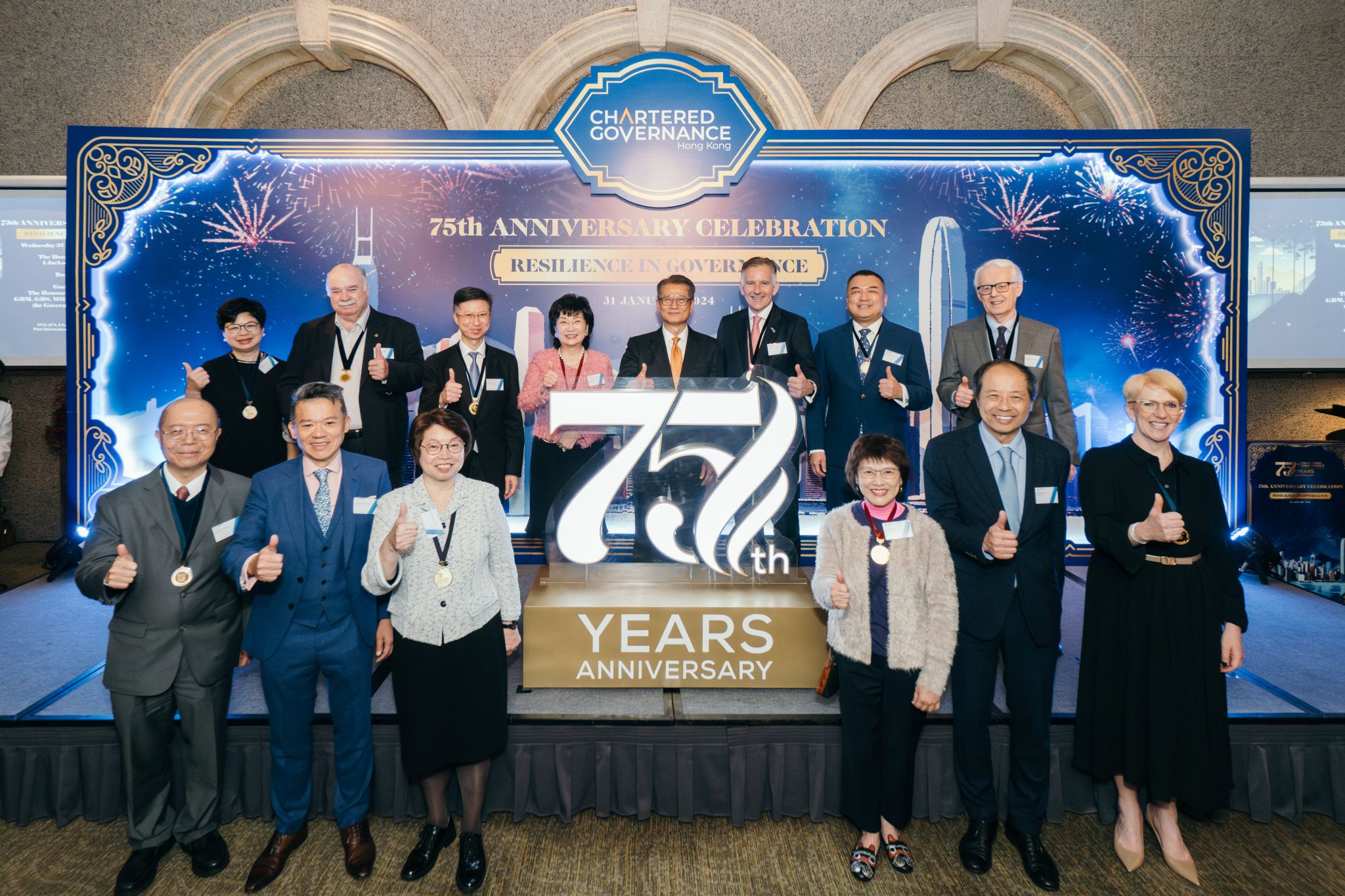A key to sustainability – The intrinsic value of governance experts

Becoming a governance professional in Hong Kong is a sign of how seriously corporate governance is taken. This is reflected in the prestigious position of the Hong Kong Chartered Governance Institute (HKCGI) as the only Qualification institution for the internationally recognized qualifications “Chartered Secretary” and “Chartered Governance Professional” in mainland China and Hong Kong.
HKCGI currently has more than 10,000 members, graduates and students. Business management professionals, including company secretaries, lawyers and accountants, are senior governance professionals who act as trusted advisors to the board and management of companies, particularly those listed on the Hong Kong Stock Exchange. They are responsible for upholding the highest standards of corporate governance, developing effective policies and procedures, and facilitating board-level communication and decision-making. Company secretaries often have expertise in areas such as compliance, risk management and stakeholder engagement, making them critical to fostering a sound yet strong governance culture within the organization.
Robust framework
Hong Kong has a robust corporate governance framework. Environmental, social and governance (ESG) is an integral part of this, particularly as it is a global standard for strategic green finance initiatives. Demand for ESG expertise has also increased sharply since the signing of the Paris Agreement in 2017. The 2050 Climate Action Plan reaffirms the city’s commitment to carbon neutrality, and the Hong Kong Special Administrative Region Government has committed to allocating HK$240 billion (US$31 billion) over the next 20 years to climate change mitigation and adaptation.
The Companies Ordinance (CO) sets out Hong Kong’s corporate governance requirements, and corporate governance provisions are also included in the company’s incorporation documents, known as the Hong Kong Articles of Association of Hong Kong Companies. The Companies (Model Articles) Notice sets out model articles that Hong Kong companies may (but are not required to) adopt. Companies listed on the Hong Kong Stock Exchange (HKEX) are required to publish a corporate governance report annually in accordance with the HKEX’s Corporate Governance Code. The HKEX Listing Rules also contain a
The Environmental, Social and Governance (ESG) Reporting Guide (to be renamed the ESG Reporting Code in 2025) sets out ongoing disclosure requirements, including information on climate change, which must be reported annually.
Central value creator
David Simmonds FCG HKFCG, President of the Hong Kong Chartered Governance Institute and Chief Strategy, Sustainability & Governance Officer of CLP Holdings Limited, says governance is a fundamental factor in creating value for an organisation. “It’s about making sure the right people have the right information to make a decision and enabling them to make the necessary trade-offs, whether short-term or long-term,” he explains. He adds that it’s also about aligning your various stakeholders with your values and vision to ensure the right decisions are made.
Over the years, the role of a governance professional has evolved significantly. It is still evolving. Today, a principles-based approach is required. Before, he says, it was about a fundamental, rules-based approach. He continues: “It was about compliance, about making sure the rules were followed, but now it is more substantive.”
That means the focus is on achieving the desired outcomes as a board and a company. Achieving these – including ESG – will involve a much broader range of people than in the past. It is no longer just about shareholders and shareholder value; it is now also about the communities in which a company does business. Sustainability – ESG – has particularly broadened the scope of corporate governance. So HKCGI is about corporate governance, not just company secretaries.
Integrating good governance
Good governance is integrated into business, sales and marketing strategies. Its importance has therefore led to a wider recognition of what a business management professional can do to help a company succeed. Part of that success is sustainability, but it’s not just about the environment. It’s also about having a company that lasts over the long term. This durability requires good governance because it allows an organization to keep an eye on current issues and the interests and stakeholders that influence the company’s operations.
Simmonds adds: “When you look at an energy company that delivers something that impacts people’s daily lives, it also impacts the economy. There are also environmental and reliability considerations to consider and a balance to be struck as these are often at odds with each other. One of the critical aspects is managing the relationships between conflicting priorities. Sustainability is a critical issue for employees and customers, as well as for governments and regulators – particularly on issues such as climate change and emissions.”
Governance professionals, he believes, must always remember that they are there to promote the values of the organization. At least, that is the guiding principle. This comes with several subordinate aspects, such as “the courage to be the canary in the coal mine or whether there are aspects that are not taken into account.” So they must be determined and patient because governance is an ongoing task; it is never finished and therefore requires continuous improvement.
Continue professional development
As part of their continuous personal development, governance professionals need to stay up to date with existing, changing and new regulations and laws. This impacts disclosure requirements such as ESG, which all companies must report on. They therefore need to expand their own knowledge and skills to add value to the company’s corporate governance framework. “Ultimately, it’s about long-term value creation, so we should look at how we can add value to the organization, not just how the regulations are applied,” he says.
To gain the right skills, Simmonds recommends membership of the HKCGI. He claims that this is the best qualification, as membership of the HKCGI is one of the prerequisites for a designated company secretary for listed companies (MA2) in Hong Kong. “To become a member, you have to pass a series of exams (and meet other relevant requirements), (MA3) and once you have membership, it is recognized by regulators like the Hong Kong Stock Exchange,” he explains.
He adds: “There are a number of other regulatory bodies that recognise members of the HKCGI as appropriate certifiers for different(JL4) (MA5) Instruments. Membership of the Institute is an important ticket to a number of government functions in Hong Kong. After acquiring membership, members are obliged to continuously develop themselves. (CPD) training. They must complete a minimum of 15 hours of CPD training each year to ensure that these skills and competencies are maintained throughout their membership.”
Fundamental role
Over the past 75 years, the HKCGI has played a critical role in qualifying and training a large group of governance professionals, providing the skills for the financial chacko of Hong Kong. In addition to training governance professionals, the HKCGI also lobbies the government and regulators to ensure good corporate governance and the development of standards – including the development of market practices – and supports these through our membership and educational programmes. The HKCGI supports its members through these initiatives based on corporate governance issues and the development of the governance standard in Hong Kong, and it is also based on the reputation the Institute has built – which Simmonds sees as a strong recommendation from its members when they are looking for governance jobs.
Good prospects
With the support of the HKCGI, the career prospects of governance professionals are very bright. One of these members and governance professionals is Emily Ng ACG HKACG, who became a member of the HKCGI in 2018. She joined ANTA Sports Products Limited in 2014 and is the company’s Senior ESG Manager. She is responsible for ESG disclosures and strategies within the company and is actively involved in promoting sustainability and corporate governance.
Ng was the company’s Senior Investor Relations Manager and was ranked second in IR Magazine’s Rising Star category in 2017 and third in Institutional Investor’s Best IR Professional-Sell Side category in 2019. Before joining ANTA Sports, she gained two years of professional experience in the banking and finance sector and completed a Master of Social Sciences in Sustainability Leadership and Governance at the University of Hong Kong.
The Hong Kong Chartered Governance Institute aims to support sustainability and ESG in general. As such, it has introduced the ESG Reporting Certification course, which has been well received by the market and adopted by many clients. Simmonds also plans to launch a Sustainability Governance Academy this year, which will focus on continuous learning and ongoing networking. He sees this as a crucial aspect of developing skills and competencies in the Hong Kong market, as it will create a community of like-minded individuals with a view to professional development. The outlook is therefore positive with the support, thought leadership and backing of the Institute.



)